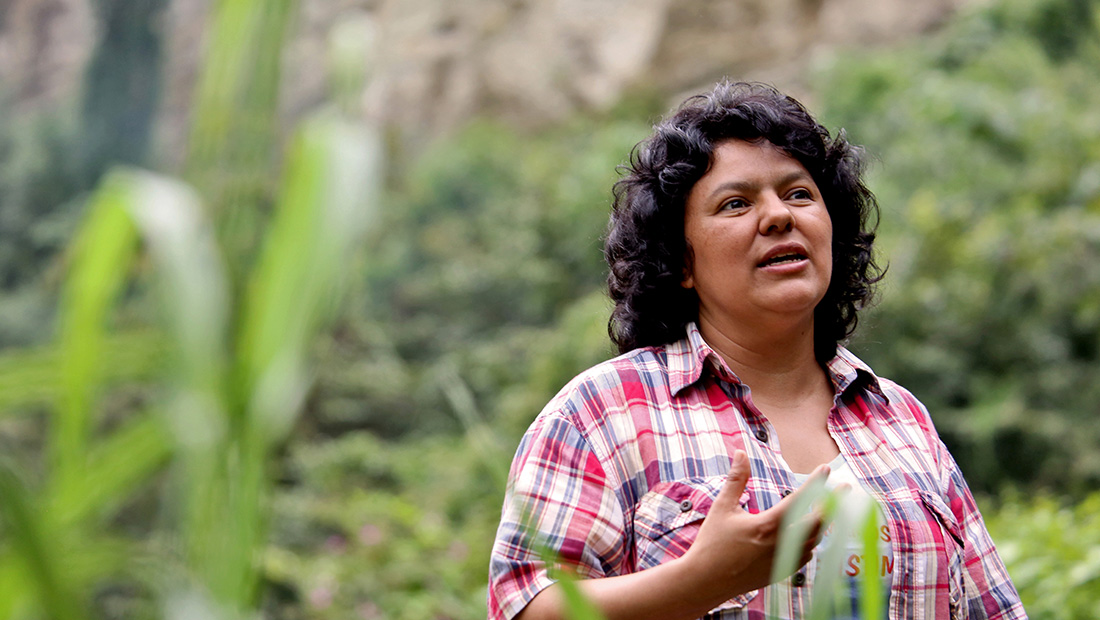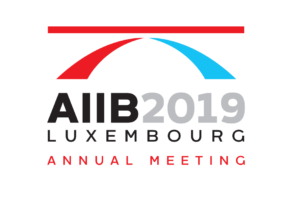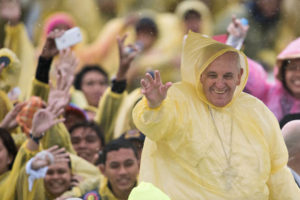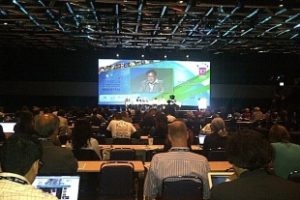IBON International statement on the murder of Honduran activist Berta Cáceres
March 2016
[[{“type”:”media”,”view_mode”:”media_large”,”fid”:”1432″,”attributes”:{“alt”:””,”class”:”media-image”,”height”:”271″,”style”:”width: 350px; height: 198px; margin: 5px;”,”typeof”:”foaf:Image”,”width”:”480″}}]]
Photo credit: The Goldman Environmental Prize
On March 3, indigenous leader Berta Cáceres, cofounder of the Council of Civic, Popular and Indigenous Organizations of Honduras (COPINH) and winner of the 2015 Goldman Environmental Prize, was murdered by armed intruders in her home in La Esperanza, Honduras. It is widely believed that these intruders were operating at the behest of the state and the private company contracted for the construction that she spent so much of her efforts protesting due to the grave danger it posed to the indigenous Lenca community. Her efforts, and the social gains attained as a result, serve as a crucial illustration of the key role of people’s organizations and civil society organizations (POs/CSOs) in development cooperation, embodying core values of a community-centered approach that should become a standard part of development cooperation practice.
Among the many ways of honoring Cáceres’s memory, the necessity of continuing her efforts should be emphasized. For the international community, this means, in part, supporting the struggle of the indigenous Lenca to protect their land, and their rights to self-determination, in any proposed development agenda. But it also means confronting the effective cause of the circumstances leading to her death: transnational linkages between repressive state forces and private enterprises often operating under the auspices and coordination of international financial institutions (IFIs).
The organization of Honduran state forces, later mobilized for the violent repression of COPINH and the Lenca community as they protested the destruction of their homes and community, underwent important changes after the US-supported coup that deposed democratically-elected President Manuel Zelaya. Of the six generals responsible for the coup, it should be noted, four were trained by the US Department of Defense, in Fort Benning, Georgia at what was formerly called the School of the Americas, but is now called the Western Hemisphere Institute of Security Cooperation, an institution known as the alma mater of some of Latin America’s most notorious dictators.
Following the coup, the new administration eagerly embraced the neoliberal development model, tooting the slogan “Honduras is open for business,” taking measures to attract foreign investors, and negotiating agreements with IFIs such the World Bank—IFC on infrastructure development. In 2010, the Honduran government approved the construction of 47 different dam project proposals, one of these being for the Agua Zarca hydroelectric dam project, a system of four interconnected dams along the Gualcarque River. The project was approved without consultation of the stake-holding communities, many of whose livelihoods would be threatened by the construction plans, despite the fact that plans encroached on indigenous territory. Such dam construction lies at an intersection of trends in both developmental and environmental policy-making.
On the environmental side, mega-dam construction has benefited from a rebranding as a “clean” energy alternative due to its non-reliance on fossil fuels, which is misleading due to under-reported negative ecological impacts and massive community displacement—both notable in cases such as that of Sardar Sarovar in India (one of the World Bank’s most recognized mega-dam construction failures) and the Three Gorges project in China (which displaced more than 1.2 million people). This clean re-branding means that dam construction presents opportunities for significant profit for big business.
This appears to have been the case for Desarrollos Energéticos, SA (DESA), which was created in 2008 to undertake the Agua Zarca project, which it obtained in a renewable energy bid in 2009. This bid was criticized by both the indigenous and ecological movements and was believed to have been manipulated by the private energy sector: it allows privatization of natural resources such as rivers, while the communities whose way of life depends on these rivers have been excluded from the process. Such privatization has long been promoted by influential bodies in development policy-making, the most important of these being the World Bank, which supported the original awarding of the Agua Zarca project contract to the Chinese Sinohydro Group. Both the World Bank and the Sinohydro Group backed out when the repression of the Lenca began to attract media attention due to the Lenca’s aggressive campaigning in cooperation with Cáceres and COPINH.
IBON International believes that honoring Cáceres’s memory means, in part, asserting that the involvement of POs/CSOs like COPINH in community and national development is indispensable. It means calling for an end to top-down development. It also requires calling for the closure of the School of the Americas/Western Hemisphere Institute of Security Cooperation, which trains students who later become part of undemocratic governments and commit human rights atrocities.
It also means understanding that, given the hostility of the fragile states like that of Honduras and the massive influence wielded by private actors like DESA, these calls are unlikely to be answered unless POs/CSOs and social movements lead the way and the international community stand in solidarity with them.




